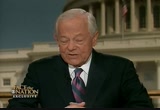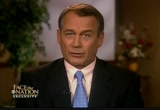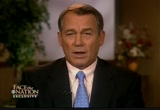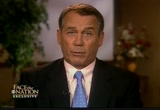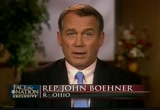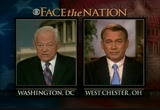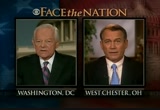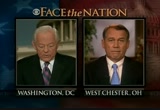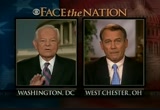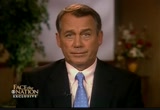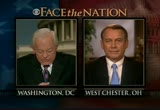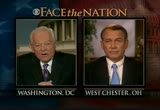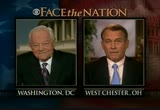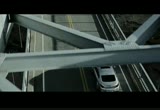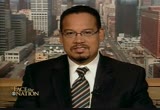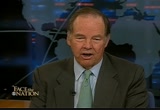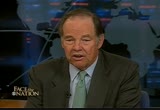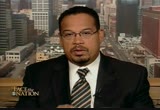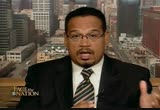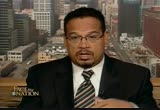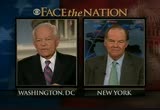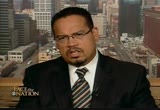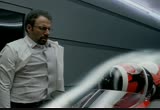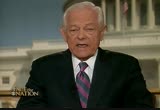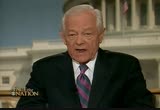tv Face the Nation CBS September 12, 2010 7:30am-8:00am PST
8:30 am
captioning sponsored by cbs >> schieffer: today on face the nation an exclusive interview with john boehner, the man who could be speaker of the house if the republicans take over. >> schieffer: today on face the nation an exclusive interview with john boehner, the man who could be speaker of the house if the republicans take over. and the nation marks 9/11 with both reference and harsh protest. >> as americans, we are not and never will be at war with islam. >> schieffer: nine years after the worst attack on america's homeland, the president found it necessary yesterday to underline just who our enemies are. we'll talk with the first muslim member of congress, keith ellison, and tom kaine, the former new jersey governor, who headed the 9/11 commission on just where they believe the country stands today on islam and the war on terror. but first, that exclusive interview with a man who may be speaker, john boehner. will he try to block middle class tax cuts if you can't get
8:31 am
the same cuts for the wealthy? we'll ask. then, i'll have some final thoughts the days after 9/11. it's all ahead on "face the nation." captioning sponsored by cbs "face the nation" with cbs news chief washington correspondent bob schieffer. and now from washington, bob schieffer. >> schieffer: joining us now from westchester, ohio, house republican leader john boehner. mr. boehner, if the republicans do take the house, you in all probability will be the new speaker. the president is already trying to make you the face of the republican party. he mentioned you by name eight times the other day in a speech in your home state. here's what he said. >> there were no new policies from mr. boehner. there were no new ideas. there was just the same philosophy that we had already
8:32 am
tried during the decade that they were in power; the same philosophy that led to this mess in the first place. cut more taxes for millionaires. and cut more rules for corporations. >> schieffer: what about that? >> well, listen, you know, the president says we have no new ideas. we've offer him new ideas for the last 20 months. and speaking of new, i wonder what's new about more stimulus spending, more taxes and more uncertainty for american small businesses. that's what the president is proposing. what's new about that? if the president wants to get serious and wants to do something new, why don't we cut spending and get rid of this notion that we can continue to spend our way back to prosperity. >> schieffer: the big difference, of course, between you and the president is that you want to extend the bush tax cuts that run out this year to all americans, including the wealthiest americans.
8:33 am
the president wants to extend them only to those making less than $250,000 a year. now, the president said yesterday, "let's do what we both can agree on. extend the cuts to those below $250,000, and then we could discuss the others." would you be willing to extend the tax cuts to the middle class, to those lower brackets, in exchange for discussing some kind of compromise for those upper brackets? >> well, bob, i think raising taxes in a very weak economy is a really, really bad idea. most economists would agree with that. i just think that if we're going to extend the tax cuts for some americans, why don't we extend these tax... current tax rates to all americans. and get rid of some of the uncertainty that is out there so that small businesses can plan and reinvest in their business and the new economy. >> schieffer: but aren't you kind of holding the tax cuts for
8:34 am
the lower-income people, the people making less than $250,000, hostage so you can give those tax cuts to the upper brackets? i mean, there are a lot more people below those top brackets than are in the upper brackets. why wouldn't you want to do something for those folks? >> i want to do something for all americans who pay taxes. and you have to understand, bob, that there are a large majorities of democrats in the house and senate-- they haven't reached out to us for the last 20 months. it's not republicans standing in the way here. there's a growing chorus of democrats in both the house and the senate who believe that we should extend the current tax rates for all americans. when you start to look at who is going to be taxed, about half of all small business income will be taxed under the president's proposal. these are the very people that we expect to invest in the economy and to begin creating jobs. why would we want to punish them? >> schieffer: let me just say this. the joint committee on taxation,
8:35 am
which is a non-partisan body, says that only 3% of those small business people you keep talking about all the small business people that are going to get taxed-- only 3% would be affected by that. do you quarrel with that figure? is that a right figure or a wrong figure? >> well, it may be 3%, but it's half of small business income. because obviously, the top 3% have half of the gross income for those companies that we would term small businesses. this is why you don't want to punish these people. especially when you have a weak economy. we need them to reinvest in their business. >> schieffer: let me just wrap this up here. are you saying that no way, no how would you vote for the... continuing the tax cuts for the folks in the middle class unless it also includes the tax cuts for the people in the upper brackets? in other words, you wouldn't be
8:36 am
willing to pass those lower- bracket extensions unless you can get the more wealthy people.... >> if the only option i have is to vote for some of those tax reductions, i'll vote for them. but i've been making the point now for months that we need to extend all the current rates for all americans. if we want to get our economy going again and we want to get jobs in america. >> schieffer: so you are saying you would vote for the middle- class tax cuts if that's all you can get done. >> if that's what we can get done, but i think that's bad policy. i don't think that's going to help our economy. i think the other thing that has to happen is that we've got to cut spending. if we cut spending, we will help our economy. we will send signals to the markets. we will send signals to the business community that washington's attempting to get its fiscal house in order. that's why the two things that i called on the president to do this week was to extend all of
8:37 am
the current tax rates, and let's do a spending bill this month, not after the election and not at bloated levels. let's go back to 2008 levels, which are about 22% below the current rates, and let's do the spending bill now. and show the american people that we can work together to cut spending and to keep the current tax rates in order. >> schieffer: but i want to make sure i heard what you said correctly. you're saying that you are willing to vote for those middle-class tax cuts, even though the bill will not include extending the tax cuts for the upper-bracket americans? >> bob, we don't know what the bill is going to say, all right? if the only option i have is to vote for those at $250,000 and below, of course i'm going to do that. but i'm going to do everything i can to fight to make sure that we extend the current tax rates for all americans. >> schieffer: but you're saying that you would do that. do you think you can get that done before the election? >> i don't control the agenda on
8:38 am
capitol hill; nancy pelosi and harry reid do. i would hope that there would be an open debate, an open process. let's let the congress decide what the current tax rates should be and for who they should be. i think there's a growing chorus on capitol hill to extend all of these tax rates. i would hope that we would do it. >> schieffer: you led the fight, a losing fight, against the wall street reform that holds the big banks more accountable, gets consumers some new protections. 73% of the american people, according to some polls, said they supported that legislation. why did republicans oppose it? >> well, bob, the three problems that caused our financial meltdown-- fannie mae, freddie mac and sub-prime lending-- none of the three are addressed in this bill. what this bill is going to do it's going to make it harder for our economy to get going again, harder to create jobs in america. why? because it's going to be difficult for banks to provide
8:39 am
credit to businesses in our country under this legislation. it creates a giant new government entity. it requires 360 new rule-making requirements in our government, and puts the government in charge of making decisions about how our financial services sector is going to work. i think it is the wrong prescription for the problems that we were facing. >> schieffer: mr. boehner, i'm going to ask you this question, because i'm not objective about this. i'm a cancer survivor. i used to be a heavy smoker. do you still smoke? >> i do. >> schieffer: you have taken $340,000 from the tobacco industry. they've been the largest contributor to your political campaigns over the year. how do you square that with the fact that cigarette smoking is the leading cause of preventable deaths in this country? 435,000 people-- their deaths are linked to cancer. that's one in five.
8:40 am
how do you justify that in your own mind? >> bob, tobacco is a legal product in america. and the american people have a right to decide for themselves whether they want to partake or not. there are lots of things that we deal with and come in contact with every day, from alcohol to food to cigarettes. a lot of things that aren't good for our health. but the american people ought to have the right to make those decisions on their own. >> schieffer: i mean, they have a right to shoot themselves if they choose to. but i mean, shouldn't we do something to try to encourage them not to? i mean, do you think that's a good example? >> well, listen. i wish i didn't have is this bad habit. you've had it. you've dealt with it. but it's something that i choose to do. you know, at some point, maybe i'll decide i've had enough it. >> schieffer: i mean, if you should become speaker, you could set an example for the country by saying i'm going to try to stop smoking.
8:41 am
maybe you could get the president. i understand he smokes, too. maybe the two of you could find a way to try to stop smoking. that would be kind of a good thing, wouldn't it? >> bob, i appreciate your suggestion. >> schieffer: all right. you have said your number one priority is to repeal the health care legislation. do you mean the entire bill, including some of the things that are so overwhelmingly popular, like the prohibition on discrimination based on pre-existing conditions for children, or allowing young adults to stay on their parents' plans until their 26? do you want to repeal the whole thing? >> well, bob, what i want to do is repeal the "obama care" and replace it with common sense reforms that will bring down the cost of health insurance and protect american jobs. and the things that you rattled off are the kinds of things that we both... both parties agree to. we agreed to before the health care bill went into law.
8:42 am
the republicans outline 8 or 9 ideas including those that would really bring down the cost of health insurance without putting the government in charge of our health care. bob, you need to understand that in my opinion, "obama-care" will ruin the best health care system in the country... in the world, and it will bankrupt our country. >> schieffer: you have been against all the programs that the administration has put out to get people back to work. what would you do to get people back to work, mr. boehner? >> well, what i've said repeatedly is what we need to control spending in washington d.c. we need to remove the uncertainty that clouds our economy from all of these new policies and programs being enacted by this congress, and we need to provide certainty in terms of what the tax rates are going to be. i believe that extending all the current tax rates would be a very good sign to the private sector that we expect to create jobs in our country. >> schieffer: how do you feel right now about november?
8:43 am
do you think you are going to take the house, and how many seats do you think you'll get? >> bob, i think winning the house is still an uphill fight. but i can tell you that we have great candidates across the country. we have a great opportunity. but if we were to win back the house, our goal is to renew our efforts to drive for a small, less costly and more accountable government in washington, d.c. >> schieffer: if you do take back the house, how many credit will you give to the tea party? >> listen, there's a lot of americans that are engaged in this election. the tea party folks, republicans, independents. for that matter, there are a lot of democrats i've talked to over the last several months who are going to show up and vote for republicans this time. this is a rebellion like i've never seen. i've never seen the american people more engaged in their government than what we see right now. i believe we're going to have a big chance in november. i'm looking forward to it.
8:44 am
8:45 am
>> schieffer: and on this anniversary weekend of 9/11, we're going to talk a little bit about that and the state of the country today-- islam, terrorism and all of that. we're joined by congressman keith ellison. he is the first muslim member of congress. took the oath of office with his hand on a koran. he is in minneapolis. and we're also going to talk with the co-chairman of the 9/11 commission, tom kaine. governor kaine, i want to start with you, because you headed that commission that looked into 9/11 and tried to figure out why it happened and what we should do about it. last week, you and your co- chairman, lee hamilton, issued another report that i must say was pretty much overshadowed by
8:46 am
the koran-burning controversy, so i want to put the spotlight on that for a minute. basically, you and mr. hamilton concluded that we have failed to anticipate the real danger we face now from home-grown terrorists. you went on to say in the report that terrorists have found our achilles heel. just how serious is this, and what do you actually mean by that? >> we think it's very serious. we think it's a growing threat because the strategy has changed. it's much more difficult for al qaeda to maybe have a great big attack like 9/11, so they're plotting smaller attacks. they're using non-traditional people to try to do them. so, the best non-traditional people they can get, frankly, are american citizens, people with passports, people who can travel back and forth. people like the person who tried to blow up the bomb in times square. they're recruiting these people every day over the internet. they're taking them to places, not necessarily in afghanistan, but somalia or yemen for training. they're trying to get them back
8:47 am
into this country to do us harm. we think that's a real threat that we've got to look at more seriously. >> schieffer: what should we be doing that we're not doing here? >> what we didn't do is a lot of recommendation. we want to alert the country. a lot of things we can do such as making law enforcement at the local level more consistent with law enforcement at the federal level. a lot of those things. we're going to come out later with some recommendations but we figure in this report the first thing we had to do was really try to alert the country and alert the federal government to what we consider a new and a very dangerous threat. >> schieffer: mr. ellison, as the first muslim to be elected to the congress, what do you think about what governor kaine is saying here, because a lot of people say, well, we've got to be very careful when we start trying to deal with american citizens because their civil liberty is at stake here. we have to be careful not to go too far. you're a muslim. what about this putting more attention on american citizens? >> well, i think that governor
8:48 am
kaine is right. i think that he is correct that al qaeda and the transnational terrorists are trying to be innovative in the ways they can hurt our country. i think the question is not whether his analysis is correct- - because i think it is-- the real question is, what do we do with the information that he has developed? i think the wrong direction is to sort of target discreet and insular minority groups like muslims and sort of focus on that community in a strict law enforcement sense. because i think that could have a negative effect. i think the bright thing to do is, one, reach out to mosques and muslim groups across the country to have open communication and trust, because these good loyal americans will be among the first to say, "you know what? we found somebody who is... we believe is suspicious." two, we need to make sure that we stand for civil liberties so we can deprive people like osama bin laden of the claim that muslims are poorly treated in america.
8:49 am
the united states is not at war with islam. the united states is a fair country. we know that there are occasions where people are not treated fairly, but those things are not lawful, so we have to stand on our tradition of civil liberties. the third thing i want to say to muslim communities across the country. talk to your kids. don't leave people out there, and understand that there are people trying to recruit your kids, and so you've got to be engaged with them. you've got to have open lines of communication with your children and with the law enforcement community. there's more things that we can do, but i think that the information is right. the question is, what do with it? >> schieffer: let me just ask you, every poll shows that the country seems to becoming more anti-islam. we saw these demonstrations in new york about where to put that mosque. one in five americans thinks that barack obama is a muslim. where is this coming from, mr. ellison? >> well, you know, i think that
8:50 am
one factor is technology. you know, anybody, even an obscure little known pastor like terry jones can do something incredibly inflammatory, get it on youtube, and all of a sudden, he's an international celebrity. that is one element. but then, there's another one. i think there is anxiety and frustration in the country. there are some politicians who believe that it's to their political advantage to identify scapegoats and try to turn americans on americans for their own political advantage by pandering to our worst instincts and fears. and then i also think, you know, you can't deny that, you know, the criminals and the murderers who did this thing to our citizens on 9/11, you know, they did associate themselves with my faith, islam. that's unfortunate. nothing in the islam i know or
8:51 am
the overwhelming majority of the muslims i know but they did make that connection so a lot of americans are just... they don't know anything about islam. i recommend that americans go out and get with your churches and your synagogues, reach out to a mosque. get to know people. in my... you know, a few years ago when ramadan was going on and yom kippur was going on, we got the congregations of jews and muslims together to break the fast. i hope people around the contry do that. >> schieffer: let me ask governor kaine. do you think, because we mentioned the fellow down there that was want to go burn these korans, he called it off, the secretary of defense called him, general petraeus spoke out about this, a lot of people say it was just a fringe character. maybe they elevated him to another level when they did that. do you i they did the right thing, governor? >> i think they felt they had to. here's a fringe character that got blown up. that's not what this country is about. in fact, osama bin laden wants this. that's his strategy is to get this war against islam its not a war against islam.
8:52 am
the majority of islam is all with us on this fight. helping us in this fight. and this is not a country about hate. never has been. we've got to recognize that. we've got to frankly deal with the majority of islam in good faith and show that we're willing to work with them as they're willing to work with us to get rid of this bad element that did this terrible event on 9/11 and would like to hurt us again if they possibly could. >> schieffer: well, governor, i just saw congressman ellison shaking his head. we have about 20 seconds... in agreement with you. about 20 seconds left. congressman, just a final thought. >> a final thought is that i'm looking and talking with my colleagues about how we could perhaps pull together a bill to help study radicalization. we don't know enough about it. we're operating on anecdotes. i think we need to move forward with governor kaine's analysis and recommendation and i commend him for his work. >> schieffer: thank you so much both of you. we'll be back with some final thoughts. [ wind howling ]
8:53 am
[ technician ] are you busy? management just sent over these new technical manuals. they need you to translate them into portuguese. by tomorrow. [ male announcer ] ducati knows it's better for xerox to manage their global publications. so they can focus on building amazing bikes. with xerox, you're ready for real business. [ but aleve can last 12 hours.g tylenol 8 hour lasts 8 hours. and aleve was proven to work better on pain than tylenol 8 hour. so why am i still thinking about this? how are you? good, how are you? [ male announcer ] aleve. proven better on pain.
8:54 am
8:55 am
>> schieffer: on the sunday after 9/11, i wrote this: "americans came together last week as they had not come together since world war ii. i first noticed it as i was driving to the capitol. the road rage of rush hour evaporated like a morning dew. instead, flags flew from car antennas, and drivers waved and gave a thumbs up as you signaled to change lanes. you could feel it at the capitol. congress passed $40 billion emergency on appropriation by an unprecedented unanimous vote. and when senate republican leader trent lott and his democratic counterpart tom daschle approached the microphones, lott had his arm around and on the shoulder of his old political foe. we all came together that day because we realized we were all in this together, that any one of us could have been in those buildings or on those planes.
8:56 am
so all over america, people went back to work with purpose. military, firefighters and police and rescue peoples risked their lives for no reason of reward but to save the innocent. partisanship faded and we set about in common cause." we can only be saddened to look across america today and realize we have let so much of that slip away. in the days after 9/11, we found what americans always find in crisis-- a way to come together. that ability, that special something we found that day, is still deeply ingrained in the american character. and somehow, we must find it again. 9/11 was a dark day, but the time after became one of our finest hours because we put aside those things that set us apart and recognized that, for all our differences, we were first of all, all americans. that's something we should remember on good days and bad. back in a minute. there's a doctor who can peer into the future.
8:57 am
there's a nurse who can access in an instant every patient's past. and because the whole hospital's working together, there's a family who can breathe easy, right now. somewhere in america, we've already answered some of the nation's toughest healthcare questions. and the over 60,000 people of siemens are ready to do it again. siemens. answers. no oil has flowed into the gulf for weeks, but it's just the beginning of our work. i'm iris cross. bp has taken full responsibility for the clean up in the gulf and that includes keeping you informed. my job is to listen to the shrimpers and fishermen, hotel and restaurant workers and find ways to help. that means working with communities. we have 19 centers in 4 states. we've made over 120,000 claims payments, more than $375 million. we've committed $20 billion
8:58 am
to an independent claims fund to cover lost income until people impacted can get back to work. we'll keep looking for oil, cleaning it up if we find it and restoring the gulf coast. i was born in new orleans. my family still lives here. bp is gonna be here until the oil is gone and the people and businesses are back to normal... until we make this right. >> schieffer: we'll see you next week right here on face the nation. captioning sponsored by cbs captioned by media access group at wgbh access.wgbh.org [ male announcer ] how can rice production in india,
8:59 am
affect wheat output in the u.s., the shipping industry in norway, and the rubber industry, in south america? at t. rowe price, we understand the connections of a complex global economy. it's just one reason 75% of our mutual funds beat their 10-year lipper average. t. rowe price. invest with confidence. request a prospectus or summary prospectus with investment objectives, risks, fees, expenses, and other information to read and consider carefully before investing. as governor, he cut waste got rid of the mansion and the limo budgets were balanced. $4 billion in tax cuts. world class schools and universities. clean energy promoted. 1.9 million new jobs created. california was working. i'm jerry brown. california needs major changes. we have to live within our means; we have to return power and decision making to the local level-closer to the people and no new taxes without voter approval. jerry brown the knowledge and know-how to get california working again.
233 Views
IN COLLECTIONS
KPIX (CBS) Television Archive
Television Archive  Television Archive News Search Service
Television Archive News Search Service  The Chin Grimes TV News Archive
The Chin Grimes TV News Archive 
Uploaded by TV Archive on

 Live Music Archive
Live Music Archive Librivox Free Audio
Librivox Free Audio Metropolitan Museum
Metropolitan Museum Cleveland Museum of Art
Cleveland Museum of Art Internet Arcade
Internet Arcade Console Living Room
Console Living Room Books to Borrow
Books to Borrow Open Library
Open Library TV News
TV News Understanding 9/11
Understanding 9/11
